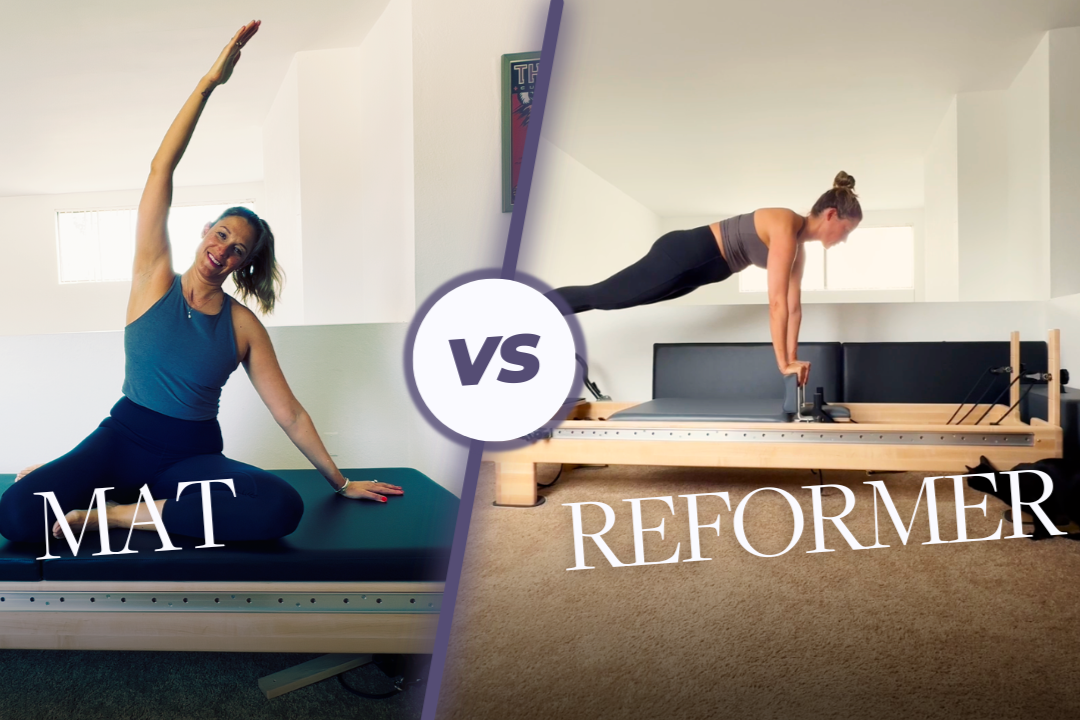Reformer vs. Mat: Which Type of Pilates Is Best for You?
Pilates has become a go-to form of exercise for anyone looking to build strength, improve posture, reduce pain, and cultivate mindfulness. But if you’re new to Pilates—or even if you’ve been practicing for years—you may be wondering: What’s the difference between Reformer and Mat Pilates? And more importantly, which one is right for you?
Mat Pilates: Simple and Effective
Mat Pilates is extremely accessible. Anyone and everyone can do it. All you need is a mat (and optional props). It is perfect for home workouts, travel, the park or the beach, and anytime you want to sneak in some movement. Basically, you can practice anytime, anywhere. No excuses.
In addition to accessibility, Mat Pilates will challenge you to stabilize your body using only your muscles, making it an excellent workout for building deep core strength.
It’s the purest form of Pilates and forms the foundation for all other Pilates apparatus work.
Reformer Pilates: Core Strength, Joint Support, and Endless Variety
The Reformer is a piece of equipment that looks a bit like a bed with a sliding carriage, springs for resistance, and straps for hands and feet. The springs add resistance or assistance to Pilates exercises, allowing for a wide range of dynamic movements that build muscular endurance and strength, flexibility and control. The Reformer also supports optimal form, which helps you move safely and efficiently. The low-impact nature of the apparatus also supports joint-friendly (and challenging) workouts - great if you are rehabbing.
Which Should I Choose?
There is no right or wrong answer for this. The choice is ultimately up to you. The Mat and Reformer are both unique in their own special ways. If you’re new to Pilates and are looking to build foundational core strength, start with Mat workouts. If you are looking to level up your practice from the Mat, try out some Reformer classes. But don’t let these recommendations intimidate you - I’ve worked with many clients who took a Reformer class for their first-ever Pilates session and they loved it.
My point is, ask yourself the following questions to determine whether Mat or Reformer is best for you:
What are your fitness goals?
Want to build deep core strength and balance? → Try Mat Pilates.
Looking to tone, sculpt, and strengthen your full body? → Opt for Reformer Pilates.
Recovering from injury or dealing with chronic pain? → A Reformer program with a trained instructor can offer more support.
What is your budget?
Mat Pilates is generally more affordable and can be practiced at home for free (with online videos or self-guided sessions). Reformer Pilates tends to be more expensive due to the cost of equipment and studio time, but offers greater customization and support.
Do You Prefer Group or Private Workouts?
Mat Pilates is ideal for group classes and home practice.
Reformer Pilates is typically taught in small groups or private sessions, making it great for those who want individualized attention.
What Does Your Body Need Right Now?
If you’re just starting out, have limited mobility, or need to build foundational strength, Mat Pilates is a great place to begin. If you’ve been doing Pilates for a while and want a new challenge or support with rehab, the Reformer might be the better fit.
Can I Do Both?
Absolutely. In fact, many seasoned Pilates practitioners incorporate both into their routines for a balanced approach.
Mat Pilates helps you develop self-reliance, deep core strength, and spatial awareness.
Reformer Pilates adds resistance and support for more advanced or therapeutic work.
Many instructors recommend alternating the two to prevent plateaus and target the body from multiple angles, or use Mat as homework for clients so they can practice on their own between Reformer sessions.
Ready To Get Started?
You can try both Mat and Reformer workouts in the privacy of Rizzo Pilates (the cats might watch but to-date don’t disclose anything about my clients), and I’ll guide you every step of the way.

